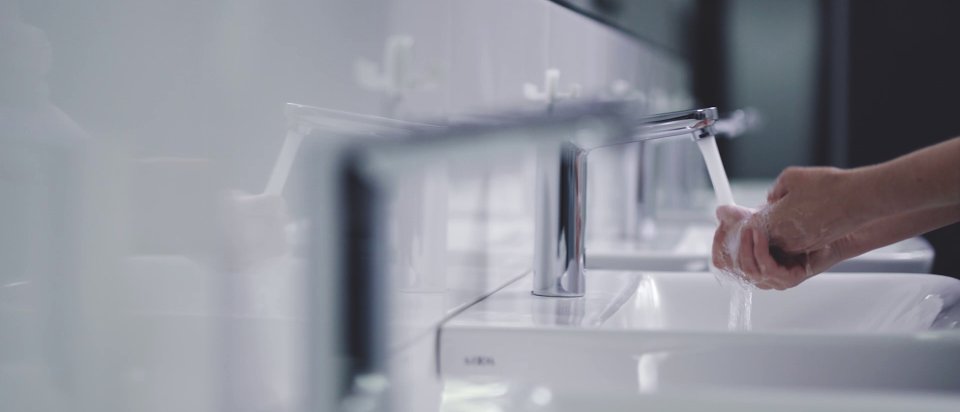
HYGIENE IN THE HOME
We share our home with a variety of different germs. Many are harmless, but some can also make you ill. These germs can be transmitted from person to person or through touching shared household items. Experts recommend taking specific measures to ensure a healthy level of hygiene in the household and to protect each other against infections and diseases. We have compiled some simple yet effective hygiene tips for you.
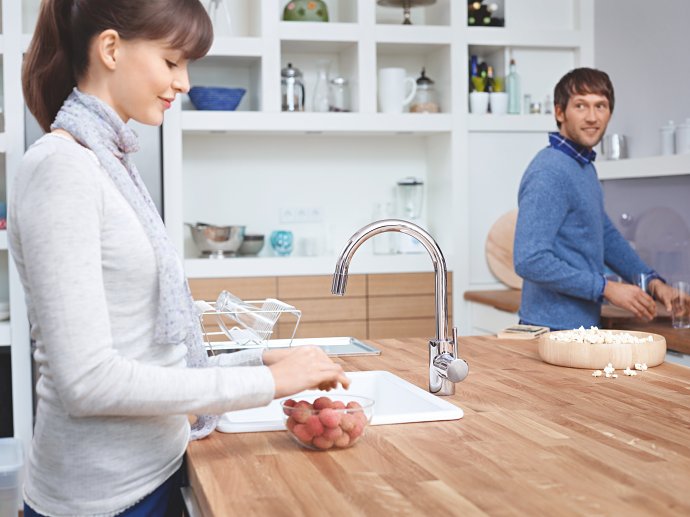
THE RIGHT LEVEL OF HOUSEHOLD HYGIENE
Hygiene in the household is important, however, not all measures are effective. For day to day cleaning, conventional cleaning products are sufficient. According to the German Federal Centre for Health Education (BZgA), these remove more than 90 percent of all surface germs when used properly.¹
EFFECTIVE HYGIENE MEASURES FOR THE HOME
Carrying out various hygiene measures regularly makes life difficult for household germs. In addition to thorough cleaning, proper washing and airing out rooms are also important. The German Federal Centre for Health Education recommends private households use following tips in their hygiene plan:
DEEP CLEANING
Germs are present all over the house. Micro-organisms feel especially at home in the kitchen. There are usually more germs on the kitchen sink and utensils than there are in the bathroom. Kitchen and food-related hygiene is therefore particularly important for preventing illness. In order to stop germs from spreading and to improve hygiene in the household, experts advise the following:
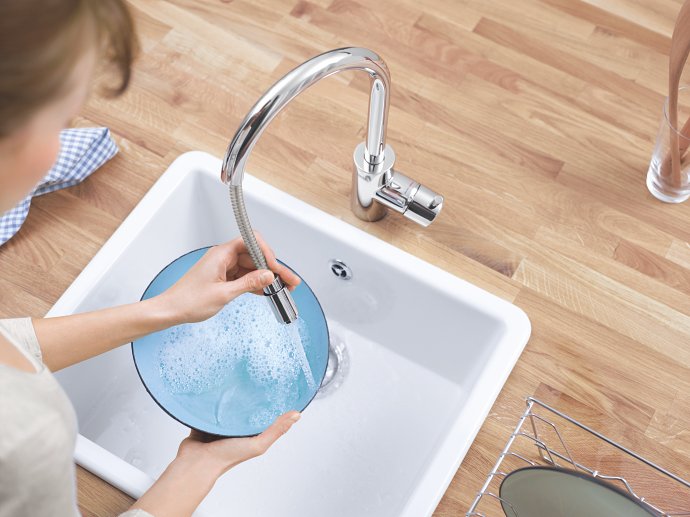
Washing up
Dishes, cutlery, and kitchen utensils should be washed with warm water and washing-up liquid. A dishwasher also provides a thorough clean, but make sure to set the temperature to at least 60°C.²
Surfaces
They are often forgotten when it comes to household hygiene practices. Bacteria multiply particularly well on surfaces that are touched quite often. It therefore makes sense to clean door handles, light switches, and cupboard handles regularly.
Our GROHE tip: Traditional kitchen and bathroom taps are touched both before and after washing your hands, so they aren’t as hygienic. Sensor taps allow for touch-free operation and can therefore help to improve hygiene in the household.
Cleaning utensils and cloths
Different cleaning cloths should be used for the kitchen and the bathroom. In the kitchen, you should use separate cloths for dishes, work surfaces, and the floor. Sponges are not recommended as they're not as hygienic. If you use a washing-up brush, you can throw it in the dishwasher to clean it. Micro-organisms feel particularly at home in damp environments, so it is therefore recommended to leave used rags and cloths to dry after use and ensure you wash them regularly at a temperature of at least 60°C.
DOING THE LAUNDRY PROPERLY
It is obvious when clothes are stained, but there is also such a thing as invisible soiling, which can be a bit trickier. In order to remove these invisible stains as well as the ones you can see, the correct water temperature and washing powder are crucial. Textiles that are used for cleaning or come into direct contact with the skin (e.g. underwear, towels, bed sheets) should be washed at a temperature of at least 60°C. Other garments can be washed at lower temperatures. Hygiene experts also recommend using heavy duty or all-purpose detergents. These contain bleaching agents and therefore give a thorough clean, even at 40°C.³
If you only use washing programmes with low temperatures and bleach-free detergents, this could lead to a biofilm developing in your washing machine. Bacteria and fungus like to make themselves comfortable on this biofilm. These micro-organisms usually don't cause any health problems. However, they can cause an unpleasant smell in the household, which comes from the clean washing as well as the machine. Your home’s hygiene plan should therefore include a weekly washing cycle at a temperature of at least 60°C, as recommended by the German Federal Centre for Health Education.
VENTILATE REGULARLY
General household hygiene is also influenced by the type of air in the room. Open the windows several times a day to exchange stale air for fresh air. Airing also reduces humidity and thus the risk of mould growth. This is particularly important in rooms that are subject to lot of moisture, such as in the bathroom and kitchen. The German Environment Agency (UBA) generally recommends keeping all doors inside the house open when airing in order to improve air exchange. However, if the air humidity is high, it’s best to close the doors inside when you ventilate to prevent moisture from spreading throughout the home.
Tips & Tricks
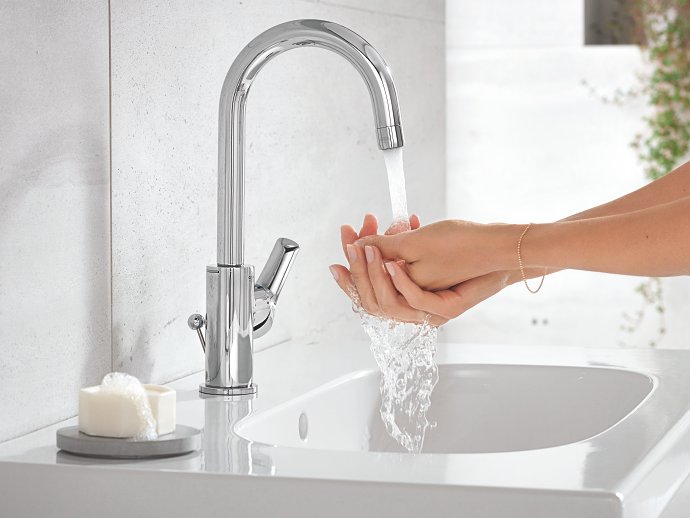
Hand Washing:
How Hand Hygiene Works
Washing hands helps to eliminate germs on your palms as well as prevent diseases. You can find out how proper hand hygiene works here!
Read more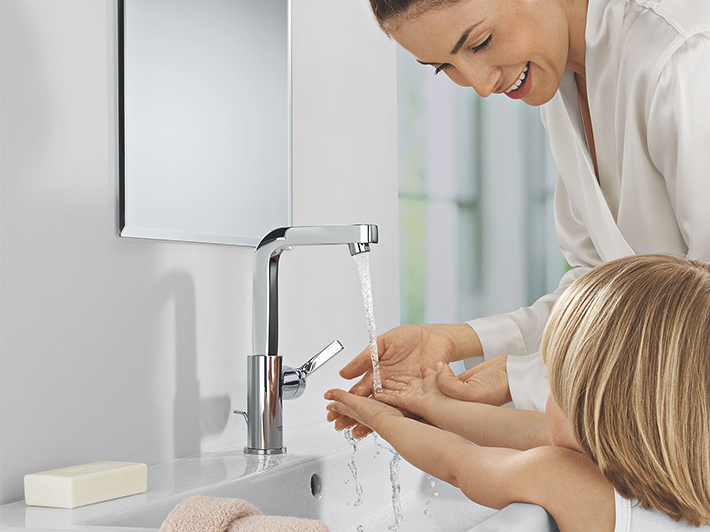
Hand Washing For Children:
How To Go About It
Children can have difficulty with proper hand hygiene. Find out how to teach children how to wash their hands in a playful way. Read on for more!
Read moreExternal sources:
¹https://www.infektionsschutz.de/hygienetipps/haushaltshygiene.html
²https://www.infektionsschutz.de/hygienetipps/kuechen-und-lebensmittelhygiene.html#c6500
³https://www.ikw.org/fileadmin/ikw/downloads/Haushaltspflege/HP_Hygienebroschuere_2014.pdf
⁴https://www.umweltbundesamt.de/themen/gesundheit/umwelteinfluesse-auf-den-menschen/schimmel/richtig-lueften-schimmelbildung-vermeiden